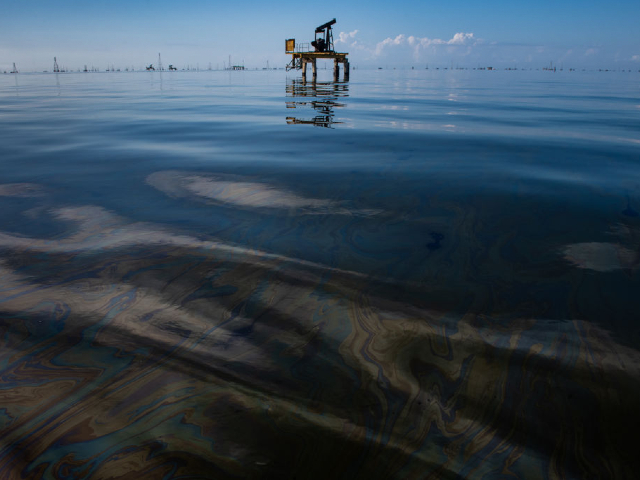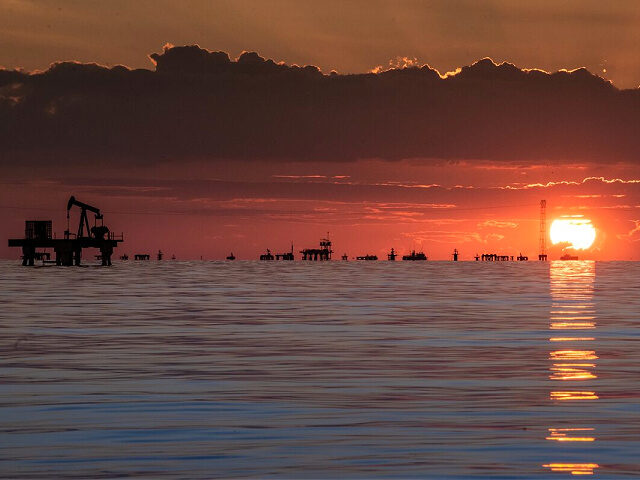CARACAS, Venezuela — The Maracaibo Environment Institute warned over the weekend that roughly 40 percent of Lake Maracaibo, Venezuela’s largest lake, is contaminated with Microcystis cyanobacteria, locally referred to as verdín (“greenery”).
The bacteria produce microcystin, a highly dangerous green and foul-smelling toxic substance that can cause severe diseases in both humans and animals. The United States Environmental Protection Agency (EPA) describes microcystin as a potent liver toxin and possible human carcinogen. EPA explains that the toxin can also kill livestock and wild animals that drink the infected water.
The socialist regime of dictator Nicolás Maduro has refused to issue a state of emergency in the region despite the extensive evidence, via satellite images recently obtained by the European Space Agency, of a brewing public health emergency.
In an interview with Unión Radio this weekend, the director of the Maracaibo Environment Institute, José Ángel Pérez, attributed the growth of the bacteria to Petróleos de Venezuela (PDVSA), the state oil company, constantly polluting the lake with oil and other chemicals. Another factor is the presence of non-functional pumping plants belonging to the state-owned Hidrolago water company bringing the lake into direct contact with sewage.

Oil floats on the water around a dilapidated Petroleos de Venezuela SA (PDVSA) oil pump in Lake Maracaibo in Cabimas, Venezuela, on Friday, Dec. 3, 2021. (Gaby Oraa/Bloomberg via Getty Images)
“The call is to PDVSA, which is responsible for this damage we are doing to our lake, to address it,” Pérez said, “there should be a working group between the three governments [local, state, and federal] to sanitize, clean, and decontaminate our lake.”
Pérez also explained that the bacteria does not just poison the lake, but affects the citizens that live near its shores, the local fauna, and fishermen who depend on the lake’s fish schools.
“Our fishermen cannot go out to fish because of the verdín,” he continued. “The call is also to conscience. Our lake has given so much, so much wealth to Venezuela, millions of barrels of oil have been extracted from here. Let us put our hand on our heart, let us rescue our lake.”
Additionally, he warned that if this problem is not dealt with soon, it will continue to worsen.
Lake Maracaibo, located in Venezuela’s western Zulia state, is the nation’s largest lake and is considered to be one of the oldest lakes in the world. The lake is also home to the Catatumbo lightning, a unique atmospheric phenomenon that causes a near-perpetual lighting storm in the region.
Authorities at the University of Zulia’s School of Agronomy released a statement on social media this week expressing concern over the Microcystis cyanobacteria and the microcystin toxic substance it produces, warning of its potential health risks and of potential “unknown effects” that it can cause to Zulia.
The U.S. EPA explains on its website that exposure to drinking water contaminated with elevated concentrations of microcystin may cause liver and kidney damage as well as cause acute health effects in humans such as abdominal pain, headache, sore throat, vomiting and nausea, dry cough, diarrhea, blistering around the mouth, and pneumonia.
The lake and its ecosystem have been subjected to recurrent oil spills caused by PDVSA’s attempts to boost the nation’s oil output without a competent staff, the product of years of socialist mismanagement that has left the lucrative oil industry in near-ruins.
A report released in June showed that Zulia accounted for 31 out of the 86 accounted oil spills that occurred in Venezuela in 2022, causing a three-to-five-kilometer-long oil slick to appear on the shores of Lake Maracaibo that month. Last week, a group of fishermen found a Trachemys turtle covered in oil and verdín. The specimen was reportedly rescued by local environmental groups.
The Maduro regime’s “Ecosocialism” Minister Josué Lorca recently declined to declare a state of emergency in the lake over the Microcystis cyanobacteria, issuing a press note last week claiming that the lake is in “excellent condition.”
“Our lake is in excellent condition, we can say so with all responsibility,” Lorca said. “The Institute for the Control and Conservation of the Maracaibo Lake Basin throughout the year, and specifically for the last two months, has evaluated the cyanobacteria by reviewing physicochemical and salinity parameters that give us a clear path of health in the lake. It is shown that the degrees of toxicity, level of reproduction, chemical demand of oxygen, and biology are stable.”
Although Maduro has asserted that socialism is “the only way to preserve the environment and the salvation of the human species,” his regime’s continued mismanagement of the nation’s oil industry and infrastructure has caused a series of environmental disasters in recent years that have gone ignored by many mainstream international environmental and climate groups.
Christian K. Caruzo is a Venezuelan writer and documents life under socialism. You can follow him on Twitter here.

COMMENTS
Please let us know if you're having issues with commenting.